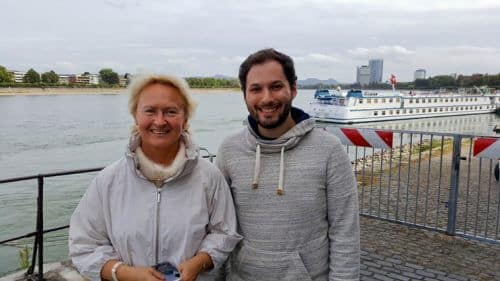Aden Avishi, a student in the Rothschild-Technion Excellence Program, published a joint article in the EPMA Journal with Prof. Olga Golovnichia from the University of Bonn.

Avishi, now 24 years old, was born and raised in Hod Hasharon, where he studied physics, chemistry and biotechnology in the excellent class at the Hadrim school. At the end of high school, when he considered leaving for an academic reserve, he heard about the Rothschild-Technion program for excellent students, which was designed to challenge excellent, curious and particularly creative students and to exhaust their abilities in learning and research. In the end, the reserve idea was shelved, but at the end of his military service, Avishi applied for the excellent program - and was accepted. These days he is finishing the third year of his studies at the Rapaport Faculty of Medicine, as part of the program.
At the end of the second year of his studies, Avishi was looking for an interesting occupation for the summer, and thus ended up at the University Hospital of the University of Bonn in Germany as part of a North Rhine Westphalia scholarship. Since he already knew what he was interested in - personalized predictive and preventive medicine (PPPM) - he contacted Prof. Olga Golovnichia from the Department of Radiology at the University of Bonn. During his stay there, which lasted 3 months, he began writing the article that he later completed at the Technion.
"PPPM is the medicine of the future and the next natural step in the evolution of medicine," explains Avishi. "This is a paradigm shift, a transition from reactive medicine to preventive medicine that is also personal. Instead of treating each patient as if he were the average patient, we will treat him according to his personal profile. By identifying biomarkers that indicate a personal tendency to specific diseases, we can prevent the development of these diseases, which will save a lot of suffering and a lot of money."
The article deals with chronic disruptions in wound healing and the connection between these disruptions and various diseases. "Wound healing is a very structured biological process," Avishi explains, "and many people suffer from chronic disruption in this process. This disruption leads to internal (such as ulcers) and external wounds not healing. Furthermore, there is evidence of a link between this problem and various diseases including cancer, Parkinson's and Plummer's syndrome. Wounds that do not heal lead in some cases to the development of a cancerous tumor."
Flammer syndrome, defined in 2014 by doctor Joseph Flammer, manifests itself in vasospasm - a disruption in the regulation of the expansion and contraction of blood vessels. As a result, there is a lack of oxygen in various tissues of the body, which leads to many symptoms including cold extremities, low blood pressure, too low weight, difficulty falling asleep, irregular sleep, variable sensitivity to medications and hypersensitivity to pain. A particularly sensitive area among Plummer patients is the eye.
During his stay at the University of Bonn, Avishai focused on proteins that disrupt wound healing in both Plummer patients and cancer patients. These are MMP (matrix metallo-proteinase) proteins, whose excessive activity damages the healing process. "The link between the activity of these proteins and the aforementioned disease can help in diagnosis in both directions," Avishi explains: "On the one hand, monitoring the level of MMP activity among cancer patients and Plummer syndrome may prevent complications related to injury, and on the other hand, a problem with wound healing may serve as a possible indication of the existence of One of those diseases."
